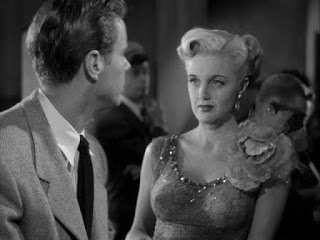Directed
by John Sturges; produced by Frank E Taylor
A
dance-hall girl (Jan Sterling) is having bad luck with men, and her luck gets
worse when she insists on seeing her latest boyfriend. The implication is
blackmail, but she is the one who pays. He kills her, buries her body and sinks
in a pond the car she stole. Months later, her remains are found and the
investigation begins. Not only must the cop (Ricardo Montalban) on the case
find out how the victim died, but who she was. This starts a tortuous process
that leads the police – and their suspects – down a crooked path.
The
title suggests a light-hearted whodunit with an amateur sleuth, perhaps a
married couple exchanging witticisms as they investigate, à la Nick and Nora
Charles. Instead, Mystery Street is
an unsentimental, realistic police procedural with a touch of film noir. The writing
credits are impressive: Richard Brooks (Key
Largo, Cat on a Hot Tin Roof) collaborates with Sydney Boehm (When Worlds Collide, Union Station) to
create a strong screenplay that says as much without words as with them.
Of
note is the use and detailed descriptions of forensic anthropology, possibly
the first of its kind in movies. A Harvard University professor (Bruce Bennett)
is key in helping solve the case. It was interesting for me to note how similar
his explanations are to those used by literary character Gideon Oliver (another
forensic anthropologist) in books written three and four decades later. The
expostulations are matched by the expectations that the audience is smart
enough to follow them.
At
first, the murderer’s identity is hidden, but when continued obscurity does not
have serve the story and is wisely discarded, it’s clear that the killer’s face
went unseen only for atmosphere. The mystery is not, then, ‘whodunit’, but how
the police will prove it.
The
characters are memorable. Montalban’s detective is strong and far removed from
stereotyped Latin policemen, though he is not flawless. Eager in his first
homicide case, he is first skeptical, then reliant, upon medical science, and
is too single-minded in his pursuit of his initial suspect. (His character’s
antecedents are, for a viewer who likes accurate detail, a bit puzzling:
attached to the Barnstable (County) District Attorney’s Office – which accounts
for his immediate involvement in the case – he later states that he worked
primarily in the ‘Portuguese district’ (of Boston). At one point, he describes
himself as a ‘stranger’ at Harvard, though his colleague, definitely a
Bostonian, admits that he is lost at the university, too: ‘not my part of
Boston.’ It’s assumed, therefore, that Montalban had left the city for the
better prospects of Cape Cod.)
The
victim’s busybody landlady is likewise well-written, though nowhere near as
sympathetic; the Harvard doctor is suitably intelligent; the principal suspect
(Marshall Thompson) realistically foolish. More minor characters have reasons
for their inclusion.
John
Sturges is credited with directing Bad
Day at Black Rock and The Great
Escape, among other movies. The direction appears ordinary yet creates a
suspenseful, involving atmosphere; like a musical score, one doesn’t realise
how skilled it is and how it contributes to a scene, until it is finished. The
setting of the movie in Massachusetts, and the location filming in Boston and
at the seaside, are refreshing in a time when crime movies, if not filmed on a
sound-stage, were placed either in New York or Los Angeles.
As
for the acting, it is top-notch. Montalban was very well-known as a leading
man, though never in the bigger films. His performances, unfortunately, became
quite hammy as time went on, but in the 1940s and ‘50s, they were natural and
convincing. The writing of the other characters would not have survived intact
if they had not been brought to life by competent players. Elsa Lanchester is
infuriatingly conniving as the landlady.
A
largely unknown film, Mystery Street
is another entertaining B-movie that rises above the image created by the
category’s name. Interesting, as well as involving, it benefits very well from
the talent that went into it.









Goodness! Ricardo Montalbán...Yes! I remember
ReplyDeletehim..he was always mistaken for an Italian...
But was Mexican in fact..Perhaps better known
for his role in the TV show Fantasy Island..
Me and my daughter never missed it..! :)
Very talented to..besides acting..did musicals
as well..
And l've just done something l've done before
John..Sent the DVD link to my daughter, seen
it before, would like to see it again..it's
to purchase on line for £3.50..($6.00)..! :o).
I'm a bit surprised this movie has been forgotten. It was a low-budget film that didn't do particularly well at the box-office, but it got good reviews at the time. Some movies just slip through the cracks, I suppose.
ReplyDeleteIt sounds like a good movie and story - the forensics angle interesting as it would seem quite primitive now in light of current programming.
ReplyDeleteIf only I were a movie person. I just don't have the patience to sit through a movie, though I know I can pause and play as I like.
I always seem to get off track with commenting about the movie in the post title; I have when World's Collide on dvd; ( 1951 version ) and Ricardo Montalban never comes to mind that I don't think of Star Trek II, The wrath of Khan.....EXCELLENT film by the way !!
ReplyDeleteI like “Star Trek II”, as well. I think it and “Star Trek IV” were the best in that series of movies, perhaps because they were, each in its own way, true to the spirit of the tv series.
Delete